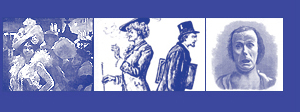Criminality
Author :
Title : London Labour and the London Poor , IV ( 1861- 1862)
Keywords:Mayhew. Outcast London. Moral Insanity. Beggars
Introduction
Henry Mayhew was one of the first and most famous of the mid-Victorian social explorers, and a respected social commentator in his day. His articles for the Morning Chronicle and his London Labour and the London Poor (4 vols.) were important contributions to the sociological study of the working classes. The first three volumes of London Labour were made up of impressionistic biographical sketches of the poor in London . The fourth was an analysis of criminal activity in Britain and Wales. Mayhew and his contributors collected statistics for each county and provided geographical or spatial representations of crime, mapped against the incidence of illiteracy, illegitimacy, teenage marriage, and so on. Mayhew propounded the idea that a ‘criminal class’, or several ‘criminal classes’ existed. The criminal class was made up of those members of society who ‘will not work’, usually due to a moral defect. Mayhew argued that this disreputable group of people was made up of vagrants, professional beggars and their dependants, cheats and their dependants, thieves and their dependants, and prostitutes. Each of these categories could be further subdivided—there were five types and twenty sub-types of thieves, for example, including ‘Till Friskers’, ‘Sawney-Hunters’, ‘Noisy-racket Men’, ‘Area Sneaks’, ‘Dead Lurkers’, ‘Snow Gatherers’, and many other attractively named criminals.
Mayhew also made a distinction between professional and casual criminals. The former possessed a ‘habitual indisposition to labour’ and made a living from crime. The latter committed crime occasionally, because of the ‘pressure of circumstances’. Though Mayhew often wrote of a criminal ‘race’, he rejected the idea that criminality was a biological inheritance. He saw it instead as a product of poverty and poor parenting. But he was not optimistic that the criminal classes could be eliminated entirely; they would always exist in some form. Mayhew’s work was followed by the much more detailed and more statistically sophisticated investigations carried out by General Charles Booth (1840-1916) in London from 1886, resulting in Life and Labour of the People in London (1 st edition, 1889; final edition, 17 vols., 1902-1903); by Benjamin Seebohm Rowntree (1871-1954) in York from 1899, resulting in Poverty, A Study of Town Life (1901); and by the Charity Organisation Society (1869-1913).
www.jhenry.demon.co.uk/mayhew3.htm
Back to Documents | Introduction | page 1 | page 2 | page 3 | page 4

